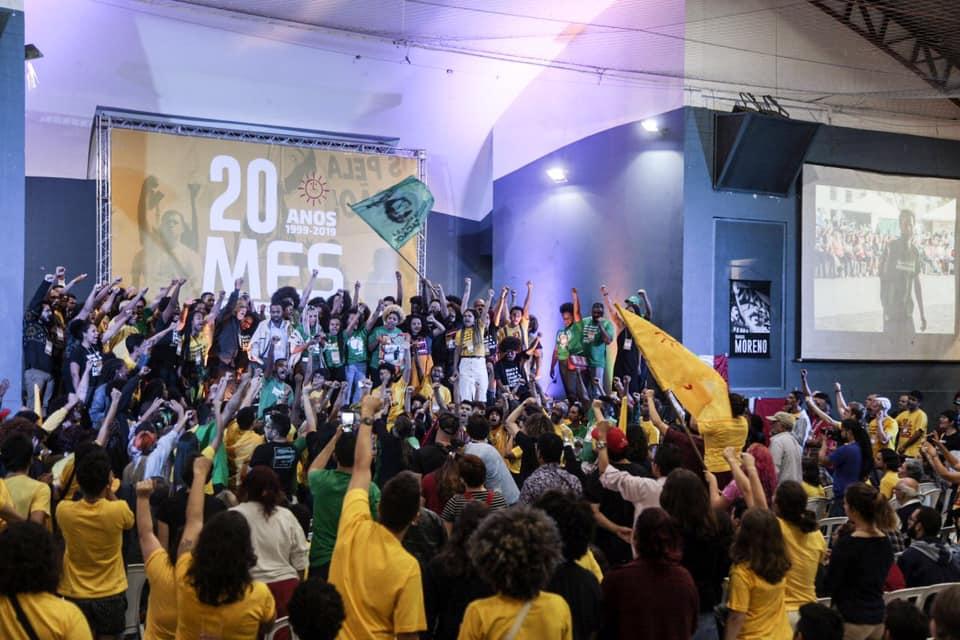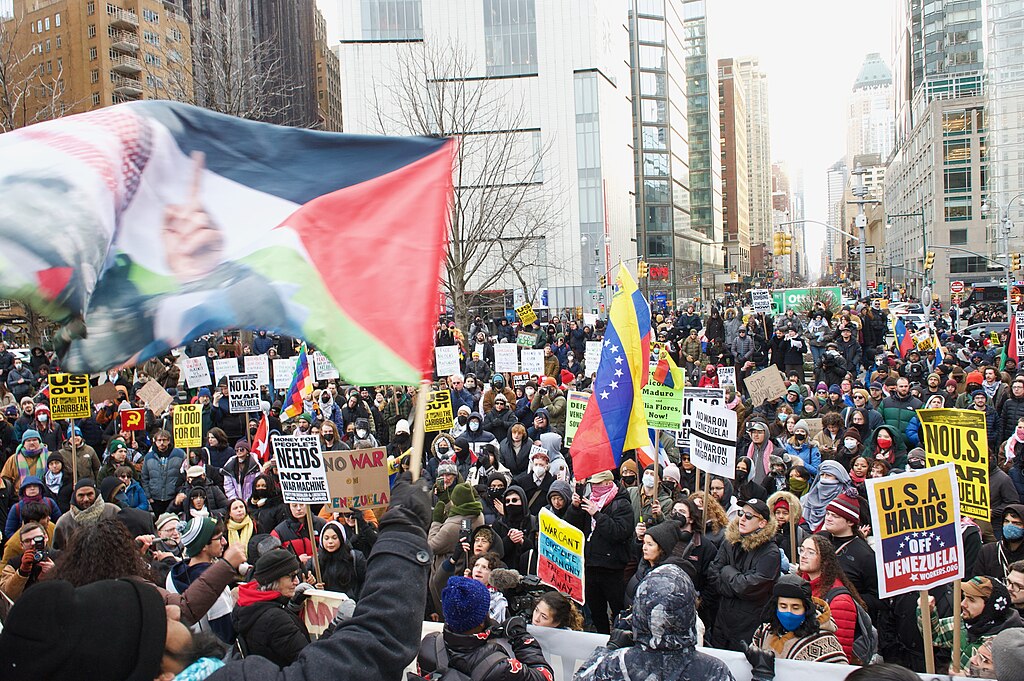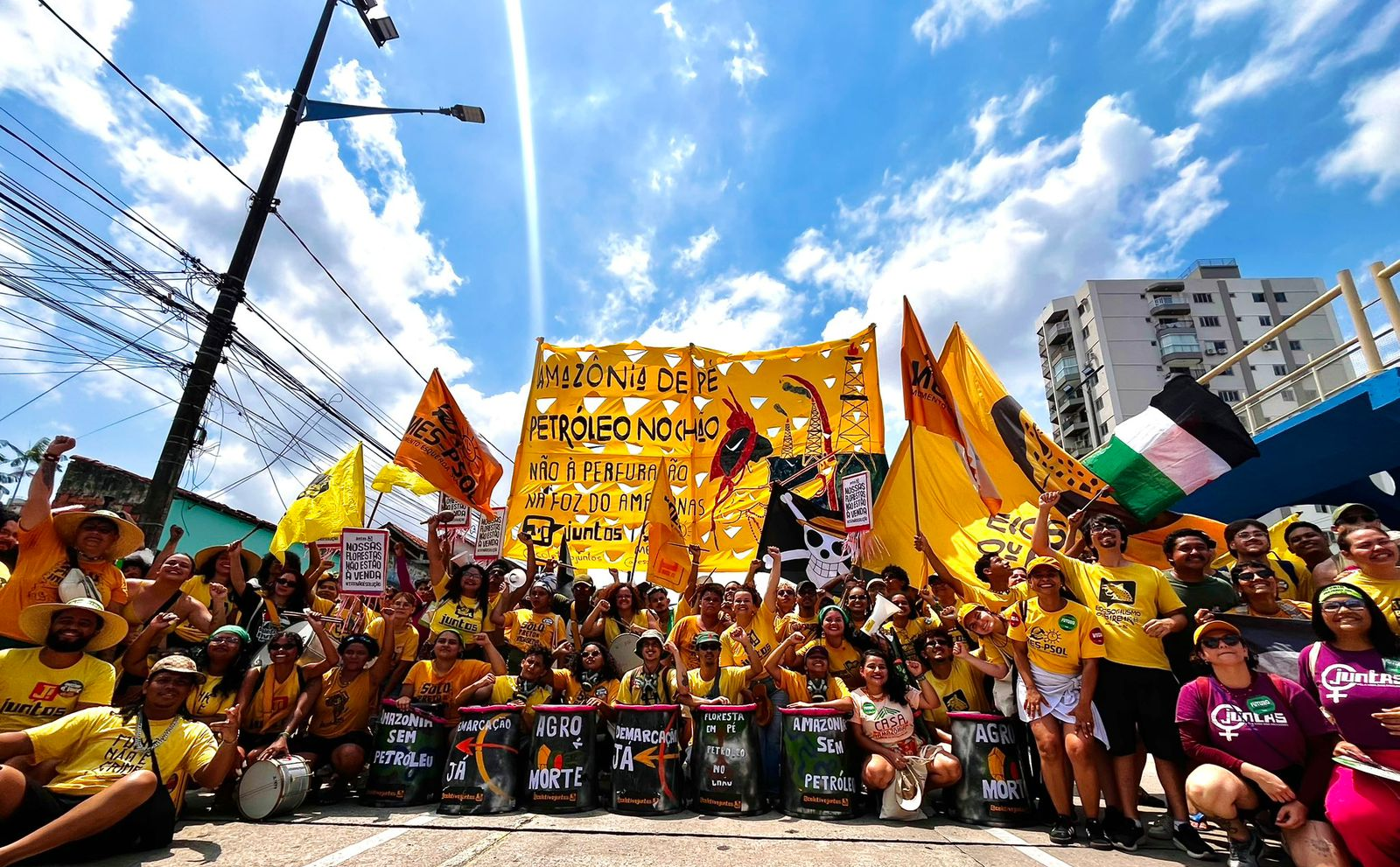This interview was conducted in mid-February with an activist from Brazil’s MES (Movimento Esquerda Socialista or Socialist Left Movement). MES is a Trotskyist organization and one of the founding tendencies of Brazil’s Socialism and Liberty Party (PSOL) — the main party to the left of the PT (Lula’s Workers Party).
Some of MES’s leaders come from groups that played a major role in overcoming the Brazilian dictatorship and establishing the PT. One of MES’s most well-known public figures, Luciana Genro, was part of the group that got expelled from the PT for opposing Lula’s neoliberal pension reforms and later went on to found PSOL.
For most of their existence, PSOL’s and MES’s trajectories have been deeply intertwined. Up until the most recent congress, where the reformist tendencies consolidated their control over the party, MES had been the second largest tendency in PSOL. Now, MES is the third largest, and it continues to play an essential role in maintaining the democratic, big-tent, internationalist, and anti-capitalist politics of the party.
Today, MES is present in 21 states with roughly 2,000 activists organized in a wide variety of social movements, including a youth and student organization (Juntos), a feminist organization (Juntas), various rural and landless workers organizations, a popular education movement (Emancipa), and a cross-sectoral union group (TLS).
Over the past few years, Bread & Roses members have cultivated a relationship with MES. We find it helpful to hear how MES — as one of the most dynamic and organized Marxist groups in the world — understands political reality and approaches the many challenges we share. In this interview, we ask an experienced MES activist about how they understand the international and national political situation and MES’s current priorities.
Cyn Huang: How is MES thinking about the global resurgence of the far right with leaders like Donald Trump and Jair Bolsonaro?
Gilberto Araujo: We analyze the global situation as one of profound crisis, which has persisted since 2008 when the most recent and still unresolved crisis of capitalism began. It is a multifaceted crisis. The economic element remains unresolved, and there is also a strong political element. Establishment parties worldwide have lost credibility. Additionally, there is a humanitarian crisis in many parts of the world, ongoing wars, and, above all, the climate crisis, which is a new factor compared to previous moments of global turmoil.
MES initially followed the left-wing responses to the 2008 crisis with optimism. In 2010, we saw movements like the Arab Spring, Occupy Wall Street, and the Indignados in Spain. Shortly after, in June 2013, Brazil also experienced a wave of protests. However, these responses lacked sufficient strength or organization to secure victory. Meanwhile, far-right responses emerged, seeking reactionary solutions to capitalism’s crisis.
Today we face a difficult situation where mass movements have not been historically defeated, but they are not strong enough. Within the bourgeoisie, there is a political divide: on one side, a liberal sector supports unpopular neoliberal economic policies while defending democratic freedoms as the best regime for capitalism; on the other, a far right with fascist or proto-fascist tendencies seeks a more radical suppression of freedoms to impose an authoritarian solution to capitalism’s crisis, targeting workers.
Trump is the key leader of this movement, inspiring figures like Javier Milei in Argentina, Bolsonaro in Brazil, Nayib Bukele in El Salvador, and the far-right Alternative for Germany (AfD), as well as leaders in Austria, the Netherlands, and Italy. This is a massive global problem facing our generation. Perhaps not since the 1930s has the far right held as much political influence as it does today.
Cyn Huang: What is your analysis of Lula’s government at this point in his term?
Gilberto Araujo: At this moment, Brazil’s political debate is dominated by panic over Lula’s declining popularity. He has long been a dominant figure in Brazilian politics, seen as almost unbeatable for years, so the fact that he could become unpopular is alarming to many.
Lula’s victory two years ago was of enormous importance. MES even described it as the most significant democratic victory in Brazil since the fall of the military dictatorship in 1985. That dictatorship, which lasted from 1964 to 1985, ended in a major democratic triumph. We see Lula’s victory over Bolsonaro in 2022 as the most important democratic achievement since then, because Bolsonaro’s re-election would have rapidly closed Brazil’s political system — perhaps even faster than what the U.S. is experiencing with Trump.
This is the starting point of Lula’s government. However, many of his decisions, particularly in economic policy, have been deeply flawed. Since Dilma Rousseff’s [Lula’s successor] impeachment in 2016 — or even before, at the end of her last administration — Brazil has followed a neoliberal austerity policy. For seven years, our Constitution imposed a rule preventing public spending from growing beyond inflation, year after year — an absolutely irrational policy.
One of Lula’s main campaign promises was to end this economic policy. He did eliminate the rule that blocked any increase in public investment. However, instead of allowing necessary investments, he implemented another restrictive rule, limiting spending growth to a maximum of 2.5% per year. This is far too little to enable real development and improve people’s living conditions.
As a result, Lula’s government is becoming increasingly unpopular, primarily due to economic dissatisfaction. Cultural factors also play a role — changes in the job market, social interactions, religious beliefs, and social customs all influence public sentiment. However, the economic situation is the dominant factor.
MES believes that unless the government makes a drastic shift in its economic policies, it will struggle to sustain itself and secure re-election.
Cyn Huang: What’s the state of the left and social movements?
Gilberto Araujo: In general, mass movements in Brazil are largely inactive. Under Bolsonaro, important struggles took place — not as frequently or as intensely as we would have liked, but they did occur. There were massive protests against his attacks on public education and women’s rights.. There were also protests against Bolsonaro’s COVID-19 policies and impeachment protests that, while not enormous, reached a national scale.
Unfortunately, for at least the last 20 to 25 years, the PT [Lula’s Workers Party] has had a tendency to discourage mass movements when in power. The PT does not believe that movements should mobilize to support the government; rather, it sees them as obstacles to governance. MES believes the opposite, but since the government holds significant influence, there have been fewer large-scale demonstrations.
One growing risk is that the right will mobilize before the left. A right-wing protest is scheduled for March 16. Over the past four to five years Brazil has seen large-scale far-right protests, some drawing hundreds of thousands of people. If such protests gain momentum again, it would be terrible for the country.
Cyn Huang: What were the takeaways from the recent municipal elections? What do they reveal about the balance of forces, and what are the implications for the next round of presidential elections?
Gilberto Araujo: The last election revealed the deep crisis within Brazil’s political system. Even the most traditional sectors of the ruling class struggled to produce stable leaders for their interests, leading to the rise of a deeply opportunistic, corrupt political faction.
This group is not strictly far-right, but it leans more toward conservatism than progressivism. MES’s assessment of the election is that Lula’s government underperformed and overall, the left lost ground. Bolsonaro himself did not secure overwhelming victories — some of his more radical candidates lost — but the faction that gained the most power was the corrupt, business-aligned sector, including agribusiness and corporate elites.
Some socialist organizations in Brazil argue that the far right won 100% of the battles and that the left should walk back its programmatic vision. MES does not share this view. However, we acknowledge that the political balance of power is worse now than before the election.
At the same time, we can draw valuable insights from PSOL’s performance. The party stagnated — it did not grow, but it also did not collapse. It shrank slightly but not dramatically. Some of the most dynamic and promising campaigns were led by MES or by allies close to us, such as São Paulo City Councilwoman Luana Alves and Fortaleza City Councilman Gabriel Biologia.
However, two major failures in PSOL were tied to the party’s mainstream leadership. First, the former mayor of Belém, Pará, ran for re-election but failed to reach the second round due to high disapproval ratings. He ran a weak administration, allied with local oligarchs, and ultimately lost workers’ support.
Second, in São Paulo, Guilherme Boulos’s campaign was crucial to Brazil’s political landscape — if PSOL had won in São Paulo, it could have reshaped national politics. However, Boulos chose to run a watered-down campaign, moderating his rhetoric and hiring a marketing strategist who had recently worked for the food delivery platform iFood — against the interests of gig workers. This was a troubling choice. His campaign lacked radical proposals, which we believe was the wrong strategy in a time of crisis.
Moreover, since Boulos lost, his campaign left behind no lasting movement. Socialists do not enter elections merely to win; often, winning is impossible. Instead, the goal is to use the electoral process to engage with the public and build political momentum. Boulos’s campaign not only failed to get elected, it lowered people’s expectations.
For example, a crucial issue in São Paulo is public transportation fares. Historically, PSOL has always advocated for free public transport. Boulos’s campaign did not take a strong stance on this. Instead, he proposed more moderate measures. After he lost, São Paulo’s new mayor raised bus fares. This put us in a weaker position to argue, “If we had won, things would be different.”
This demonstrates the importance of maintaining a radical program, even in electoral campaigns, to genuinely mobilize people and create lasting political movements.
Cyn Huang: The scenario you describe poses difficult questions for the left. How do these contradictions play out in PSOL?
Gilberto Araujo: PSOL is experiencing significant internal divisions over its relationship with the Lula government. PSOL holds a significant role in Brazilian politics as the largest left-wing party after PT. Although its leadership has become largely submissive to PT, a significant portion of society still views PSOL as at least somewhat different from PT — perhaps even better in some respects, as it has never been involved in corruption scandals, generally defends workers’ interests, promotes key democratic causes, and represents a greater degree of political renewal than PT.
Even under Lula’s government, PSOL, thanks to pressure from MES, has maintained its political program in certain key votes. For instance, when discussing Lula’s economic policies, I mentioned the new investment cap that allows only 2.5% annual growth in public spending. This was an absurd proposal, and MES convinced PSOL to vote against it. This was an important political stance.
However, what truly defines a political party is not just how its representatives vote in parliament but how it positions itself in society — what campaigns it runs, how it communicates its ideas, and how it publicly relates to a given government or leader. Since Lula’s campaign and especially since the beginning of his administration, the dominant faction within PSOL has used the challenging political moment — one that requires unity with PT to defeat the far right — to push for a deeper programmatic and political alignment with the government.
To illustrate this shift, during Lula’s and Dilma’s first administrations, PSOL unanimously positioned itself as a left-wing opposition party without any internal disagreements on this stance. Today, the situation is very different.
MES believes that, given the historical moment, the strength of the far right, and Bolsonaro’s prior administration, it would not be correct for PSOL to adopt a declared opposition stance and constantly act against the government. However, instead of simply taking an intermediate position, we should adopt a stronger, more coherent stance: independence from the government. This means defending the government when it faces coup attempts or opportunistic attacks from the far right, but not integrating with it, not taking government positions, not making deep commitments to it, and not abandoning the mobilization of mass movements — even when that means organizing protests against the government.
There are many instances where labor unions, social movements, and youth organizations must mobilize against the government to push for necessary policies. This is essential for fulfilling a socialist party’s most important role in political life: strengthening the balance of power in favor of the working class.
The majority of PSOL’s leadership subordinates itself to the government, guided by the idea that any critique of the Lula government — even its anti-worker policies — strengthens the far right. We argue, though, that this approach removes a key political actor from the equation: independent mass movements and socialist organizations. Without active and independent workers’ movements, with a strong presence and a radical program advocating for transformation, the political balance will only continue to worsen, even for a reformist or social-democratic government like Lula’s. These are the main internal divisions currently within PSOL.
Cyn Huang: Tell us about MES’s priorities for this coming period.
Gilberto Araujo: Well, last year MES celebrated 25 years of existence. PSOL also celebrated 20 years of existence, having been founded by MES. A very important aspect of our development is related to the movements we engage with. For example, the fact that we co-founded Juntas, a feminist organization, in 2011 is strategically significant. The Emancipa network, a popular education initiative, allows us to establish a deep social presence, working in the outskirts of major cities as well as in rural areas.
Our work in unions has also seen significant progress, especially in the education sector, after our merger with TLS, a cross-sectoral labor organization. Additionally, we have built electoral strength, electing public figures who now have a mass presence, whether at the national level or within their respective cities and states, across Brazil from North to South, including the Southeast and Northeast. Our electoral influence is weakest in the central-west region, which is more challenging politically.
MES always prioritizes what we call the two permanent tasks of Marxist militants worldwide: stimulating mass movements and building our party. When we talk about building our party, we mean both strengthening PSOL as a broad and diverse tool and consolidating MES as our specific revolutionary, socialist, and Marxist strategy.
Within PSOL, an important upcoming process is the party’s likely programmatic renewal. Since its founding 20 years ago, PSOL has never updated its program, so this process is necessary. However, we suspect that the party’s majority may attempt to weaken its socialist character. MES will fight to ensure that the new program advocates class independence and remains fundamentally socialist.
In 2025, COP30 will take place in Belém do Pará, an event of international significance in the context of the climate crisis. PSOL has a strong track record in ecosocialism and environmental advocacy. This issue is one where we differentiate ourselves from the PT in a significant way. We will push for PSOL to oppose oil exploration at the mouth of the Amazon River and to denounce the COP conferences as mere gatherings of establishment elites and corporate lobbyists, excluding grassroots movements and affected communities. Instead, we aim to build a bottom-up forum, not just legitimize COP30 as it currently stands.
Our agenda also includes the Fourth International Congress. We are working for MES to become part of the International Charter. We are preparing for upcoming labor and youth movement events, including the National Union of Students Congress, where we are enthusiastically inviting youth from Bread & Roses and DSA to participate.
From MES’s perspective, internationalism is always a guiding principle. This is even more critical in today’s world, as we closely watch the situation in Gaza. Trump’s core policy is not about promoting peace but about consolidating a dangerous balance of power in the Middle East. He deepens a priority relationship with Netanyahu’s far-right government and threatens with a catastrophic ethnic cleansing.
We are also concerned about the war in Ukraine. From the beginning of Russia’s aggression, we have defended the Ukrainian people’s right to self-defense and self-determination. We oppose Russian imperialist expansionism just as we oppose U.S. and NATO imperialism. However, we are now seeing early indications that Trump’s administration may try to negotiate a ceasefire that primarily benefits Putin rather than prioritizing the Ukrainian people’s right to resist.
Additionally, immigration is a major concern. Trump’s immigration policies stand out as the most fascist aspect of his agenda, as they are based not only on authoritarian governance but on the dehumanization of entire social groups — similar to what historical fascist regimes did to Jews, LGBTQ+ people, Romani people, and Black communities. This criminalization of immigrants should serve as a wake-up call for a new internationalist, anti-imperialist, and antifascist resistance movement.
In summary, MES is focused on training cadres, expanding our grassroots presence, growing our social movements, and promoting international solidarity in the fight for socialism. We will continue to fight within PSOL to push for a radical strategy rather than a reformist one.
This interview was conducted on February 17, 2025.




